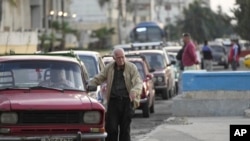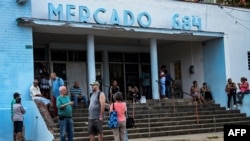“Down with communism, down with Díaz-Canel,” a Cuban woman chants defiantly.
The unidentified woman appears in a video of the latest wave of protests in Cuba this week against the island’s communist government and its president, Miguel Díaz-Canel.
It’s one of several posted on Facebook and passed to VOA as demonstrations broke out in at least five locations across the country.
The protests, prompted by prolonged blackouts and food and medicine shortages, were the largest since October 2022 following a power cut that lasted nearly a week in the wake of Hurricane Ian.
Analysts say this is the worst breakdown in living conditions since the collapse of the Soviet Union in the 1990s.
After record warm temperatures this month, they warn more power cuts in this summer may cut air-conditioning and cause food to rot, sending people out to the streets again.
“In this context, people are fed up. They are people who [no] longer have anything to lose,” Michel Suárez, co-founder of Diario de Cuba, a Madrid-based independent online news site, told VOA.
Fifteen people were detained by Cuban police during the latest unrest, according to Prisoners Defenders International, a Madrid-based human rights group.
Against this backdrop of turmoil and repression, Cuba’s economic figures signal more trouble ahead. Cuban government officials say annual inflation in 2023 was at 30%. The fiscal deficit is forecast to reach 18% of GDP in 2024.
Tourism, which in 2019 accounted for 11% of the GDP, has not fully recovered from the COVID-19 pandemic. In 2023, only 2 million people visited the island compared to 3.6 million in 2019.
Venezuela, facing its own pressures, cut crude oil shipments to the island last year.
The U.S. trade embargo, which prevents U.S. businesses or U.S. citizens from conducting trade with Cuban interests, has had an enduring effect on Cuba’s economy.
With no prospect of democratic elections that could change the government or its economic policies, analysts say Cuba is also suffering a brain drain as many young people continue to flee the country.
The Washington Office on Latin America, an advocacy group, reports that between 2022 and 2023, about 425,000 Cubans went to the U.S. and 36,000 claimed asylum in Mexico. Others went to Western Europe and Russia.
The number of people leaving is equivalent to about 4% of Cuba’s population.
Food shortages, blackouts
William LeoGrande, a specialist on Cuba at the American University in Washington, said more protests could erupt later in the year because of continuing food shortages and blackouts.
“The cause of these protests is pervasive shortages of food and medicine and on top of that the electrical grid is in a state of collapse. People are suffering up to 18 hours a day without electricity. There is a profound frustration with the government’s inability to provide basic services,” he told VOA.
The private sector has not been allowed to expand enough and has in fact worsened social inequality, LeoGrande said.
There are about 10,000 small businesses, which account for 14% of GDP, according to the Cuban government.
Private companies “are not going to solve the problem in the short term. The expansion of the private sector has aggravated social discontent,” LeoGrande said.
“Havana has allowed a small number of private grocery shops, but Cubans cannot afford anything there. That has aggravated the political situation.”
Cuban state media showed posts Monday of members of the U.S. Congress commenting on the protests on social media and accused Washington and Cuban exiles in the U.S. state of Florida of being behind the demonstrations.
“Mediocre politicians and networked terrorists lined up from South Florida to heat up the streets of Cuba with interventionist messages and calls for chaos. They were left wanting,” President Díaz-Canel posted on X, formerly Twitter.
U.S. Department of State deputy spokesman Vedant Patel on Monday called the claim “absurd,” adding Cuba’s dire economic situation is what prompted the protests.
Anna Ayuso, a Latin America specialist at the Barcelona Center for International Affairs, said Cuba was bankrupt and unable to pay for imports on which it depends for food and other essentials.
“There is scarcity of medicine, food, delays of delivering help from the World Health Program. Everything is collapsing because Cuba has no foreign exchange to buy these things and it produces next to nothing,” she told VOA.
Cuba’s failure to modernize its economy as China or Vietnam have done is at the root of the problem, said Rogelio Nuñez, a professor of Latin American studies at the Real Elcano Institute, a Madrid think tank.
“There are different wings within the regime who are fighting for power and have vested interests. These are the politicians and the armed forces,” Nuñez said.






